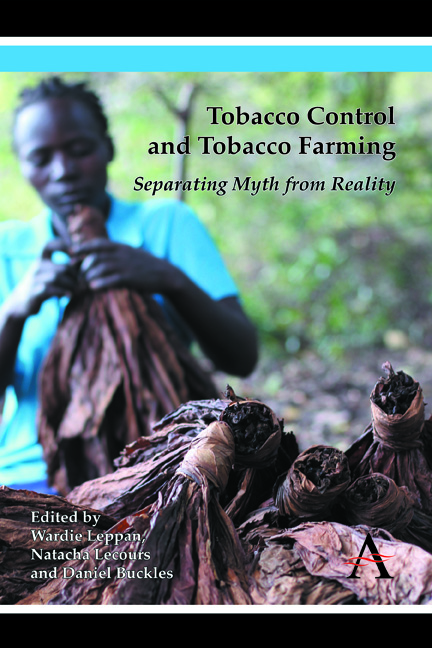Book contents
- Frontmatter
- Contents
- List of Figures, Tables and Photographs
- Foreword
- Preface
- Introduction: Separating Myth from Reality
- Section One The Determinants of Tobacco Leaf Demand
- Section Two Tobacco-Farming Conditions in Low- and Middle-Income Countries
- Section Three Economically Sustainable Alternatives to Tobacco
- Conclusion: Reframing the Debate on Tobacco Control and Tobacco Farming
- Annex: A Policy Brief on Tobacco Control and Tobacco Farming
- Contributors
Introduction: Separating Myth from Reality
Published online by Cambridge University Press: 05 November 2014
- Frontmatter
- Contents
- List of Figures, Tables and Photographs
- Foreword
- Preface
- Introduction: Separating Myth from Reality
- Section One The Determinants of Tobacco Leaf Demand
- Section Two Tobacco-Farming Conditions in Low- and Middle-Income Countries
- Section Three Economically Sustainable Alternatives to Tobacco
- Conclusion: Reframing the Debate on Tobacco Control and Tobacco Farming
- Annex: A Policy Brief on Tobacco Control and Tobacco Farming
- Contributors
Summary
Knowledge of the harmful effects of tobacco use has prompted sustained efforts to regulate the industry that produces and markets tobacco products. The last decade has been encouraging with the development of the first global treaty negotiated under the auspices of the World Health Organization (WHO). The Framework Convention on Tobacco Control (FCTC), adopted by the World Health Assembly on 21 May 2003, entered into force on 27 February 2005 and counted 178 adhering parties as of April 2014. It is an evidence-based treaty that sets out objectives and principles that parties must follow. The articles of the convention include demand reduction measures like tax increases, health warnings, advertising bans and smoke-free environments. The FCTC also includes measures related to farming of tobacco (Article 17 on provision of support to economically viable alternative activities) and the environment (Article 18 on protection of the environment and the health of people engaged in tobacco cultivation and manufacture). As one of the most widely embraced treaties in the United Nations' history, it is a powerful tool to curb tobacco use across the globe. It is also viewed as a serious threat by the tobacco industry, which regularly challenges government implementation of the FCTC.
That the tobacco industry actively seeks to delay, dilute and defeat attempts at tobacco control should not come as a surprise. For the industry, opposition is an existential imperative.
- Type
- Chapter
- Information
- Tobacco Control and Tobacco FarmingSeparating Myth from Reality, pp. 1 - 10Publisher: Anthem PressPrint publication year: 2014



